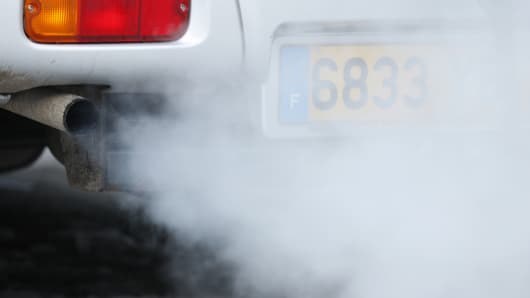The $15 billion Volkswagen may spend to settle its diesel cheating scandal – potentially one of the largest consumer settlements in U.S. history – is a huge waste of money.
As predicted in a letter that I, together with many other prominent CEOs, investors, and environmentalists sent to regulators last year, no compelling answer has emerged on how to fix the diesels, and I believe none will.
Combustion engines are nearing the point where emissions improvements are no longer achievable without compromising other important attributes like performance. As part of the settlement, Volkswagen owners can either choose to have their cars fixed – an option that will likely decrease their performance – or sell them back to the company.
The $10 billion earmarked in the settlement to compensate Volkswagen's customers factors to over $20,000 per offending car. This indicates that the company is planning on most people going for the buyout, and that the cars will be crushed before the end of their useful lives – a massive waste of resources that further injures our environment.
A far better solution would have been to allow the company to use this money to further its electric vehicle program. That money could have gone a long way. It's likely that such an influx of cash could have accelerated the adoption of electric vehicles in the United States, doing a lot more to clean the air than removing the 475,000 offending Volkswagen diesels.
Yet the settlement is not a total loss. The combination of a $2 billion commitment to invest in zero-emissions vehicles and the $2.7 billion Volkswagen will put into an Environmental Protection Agency-administered program to clean the air – part of the overall settlement – is exactly what we advocated for in our letter to California regulators late last year.
A major portion of the Volkswagen funds should be spent building charging infrastructure domestically, with a multiplier effect on the adoption rate of electric vehicles, and thus the reduction of emissions. Even this relatively modest sum could result in clean air benefits that dwarf the original injury.
Tesla is creating its supercharger network of 655 stations. With Volkswagen's funds, we should see a dramatic increase in the number of such charge points, to many thousands. As a result, we may soon have as many rapid chargers as gas stations along U.S. highways, breaking through the "range anxiety" – or the fear of running out of power – that's the Achilles heel of electric vehicles. Charging infrastructure will also be built for bus routes in cities, reducing urban pollution.
Besides the settlement, Volkswagen recently announced plans to invest $11 billion in battery factories in Germany. This is a strong sign that Volkswagen sees its future as largely electric. The resulting jobs from manufacturing battery cells will help offset the job losses due to the diesel crisis and the future decrease in new cars sales due to the growth of car sharing.
It also may prompt other big automakers to follow suit. It is no coincidence that Daimler revealed similarly ambitious plans on electric mobility in the past few weeks.
The fact is that no internal combustion car, whether from Volkswagen or any other car company, diesel or gasoline, lives up to its emissions promises when measured on the road in actual use. To various degrees, everyone is cheating. The litigation, regulatory and brand risks of continuing to operate in shades of gray on emissions has now been exposed, and all automakers are terrified.
In the near term, Volkswagen's transgressions may result in thousands of cars being brought to a premature end, but it may portend a new future for the automobile in the United States and elsewhere. The shift to electric vehicles is imminent and the Volkswagen diesel scandal helped to cement it.


